Author Interview-Jeffrey Kosh
Jeffrey Kosh
Author, Graphic Artist, International Man of Mystery
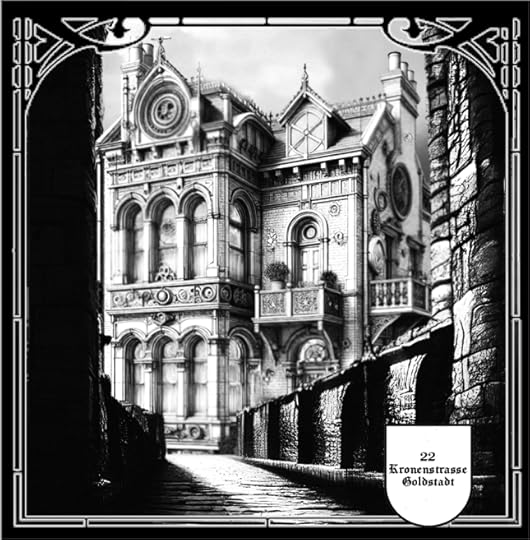
Doctor Richter Townhouse
To personally meet Jeffrey Kosh one needs to travel to a place that doesn’t exist, as he is currently living at 22 Kronenstrasse, in Goldstadt, the capital of Wissenheim.
This is the home—and office—of Doctor Maximilian von Richter, forensic pathologist and criminologist. The good doctor has provided Jeffrey with a small spare room inside his townhouse in order for him to continue his chronicles of terror.
In fact, after a long hiatus from writing, my old friend and cover artist has decided to leave our time and isolate himself in this fictional city. The current year here is 1922 and it’s charming and refreshing looking at Ford Model T and Duisenberg cars dodging horse-drawn calashes and early delivery vans.
I’m received by Ronny Cicero, Richter’s butler. He is a short, nasal-toned, and mischievous-looking fellow of Italian origins who never ceases babbling. He fills my ears with questions that he then answers himself, and in the short trip that takes from the first floor to Jeffrey’s quarters he’s able to update me on local events of which I don’t frankly care.
“How do you do, my friend?” asks Jeffrey in a that old-fashioned tone typical of 1930s horror flicks. “I hope you like my new home.” He offers me a glass of Marillenschnaps (a type of fruit brandy that is distilled from apricots) and then points to an over decorated and overstuffed armchair, motioning for me to make myself comfortable.
From the large, semicircular window behind him I can see the picturesque peaked roofs of the ancient district of Unterburg rubbing shoulders with the ritzy art deco buildings of Neondorf. And beyond, towering above it all, the spectacular but shabby Wunderturm.
“I’m fine,” I say, “A bit disoriented by the dimensional shift, but I’m okay.”
“Excellent.” He continues with that démodé attitude and I can’t fail to notice of how Jeffrey Kosh, the author alter ego of the real life Massimo Zini, has perfectly adapted to his new workplace. He wears a tailored black suit under an outdated robe of the kind he Basil Rathbone wore in any single one of his movies. His hair is short and parted and he sports weirdly looking mustaches that look like a pair of squashed caterpillars under his nose.
While Massimo Zini lives in the village of Auterive, in southern France, his writer persona has permanently moved to the fictional Grand Duchy of Wissenheim, a tiny country formerly part of the Austro-Hungarian Empire nestled among the Bavarian Alps.
“Let’s get down to business,” he says before finishing his liquor in one gulp.
“First of all,” I clarify, “this interview is about the both of you, so I hope you don’t mind me asking questions that are more related to Massimo’s main personality.”
“No problem at all,” he replies. “I don’t have secrets… for you.” That last bit sounds a bit off; much in the way Bela Lugosi would say that he never drank… wine. I ignore it and start my questions. I know he’s a weird fella.
Okay buddy. Let’s pretend that we’re just meeting. Let’s give the readers a chance to get to know you. Tell us a little about yourself. Are you married? Do you have any children?
JK: I do have a partner that I plan to marry, once I get my divorce finalized. Unfortunately, I wasn’t blessed with any biological children of mine. But I do have a brilliant British stepson that I love as if he were blood of my blood.
Me: Trust me. I can relate to that. What’s weird in my situation is, my stepson looks more like me than my biological sons do. Let’s go to the next question. What do you do for relaxation?
JK: Relax? What’s that? I wasn’t made aware I was entitled to it. Golly, I’m the kind of guy that can’t never relax. I lived two years in Thailand –one of the most relaxing places in the world- and I managed to get stressed even there.
Me: You’re braver than I am. I’ve enjoyed a few Thai dishes and they were way too spicy for me. Still, I understand being stressed even in paradise. Okay, next question: Are there any recent works (books) that you admire?
JK: The Alienist by Caleb Carr. This is the last book that I truly enjoyed, as it’s the closest to the kind of novels I like, such as The Silence of the Lambs and the Special X series by Michael Slade. Unfortunately, I can’t say the same for the sequel, The Angel of Death, but this is mostly due by a stylistic choice of the author.
Me: I’ve not read those. But then, I’ve read very little over the last few years. That’s a long story in itself. Still, who is your favorite author and is there a reason why?
JK: There are many. However, the top spot is—and will ever be—reserved to Mary Wollstonecraft Shelley. Frankenstein or the Modern Prometheus is the novel that brought me into English literature. I wish she had written more stories like that. On a more generic note, I admire writers such as you that are able to write whole series with recurring characters. An outstanding feat, if you ask me.
Me: No need to butter me up. But I’ll accept the accolades. Having started your latest creation, I can see why Mary Shelley would be a favorite. To me, your styles seem to go hand in hand. Are there similarities between yours and her work?
JK: I wish. Unfortunately, I’m a paranoid and very neat monster; I spend many hours researching tiny but accurate details about everything that I need inside my novels. Sometimes, like in Feeding the Urge (the main character is an Assistant Medical Examiner) or in my most recent one (Beyond Frankenstein, where one of the characters is a forensic pathologist and another is an undertaker), it’s easier as I can use my own personal experiences as a former mortician, but when it’s about police procedure in German-speaking countries in the Interbellum era…
Me: Oh, I can only imagine. I worked law enforcement for many years and even now, I hesitate to write anything procedural because not only do times change, but it seems that procedures differ from agency to agency. Anyway, how about something a little more basic? Why do you write?
JK: Honestly? I have no idea. My books are quite niche, as I tend to write what comes to my mind not what is trending. How many readers are out there interested in a pulp gothic story set in the fictional world of 1930s horror movies?
Me: Okay, yeah. That’s a pretty specific niche. Still, I understand writing about what you like. If you attempt to write on a subject that doesn’t inspire you…it tends to fall flat and the readers notice. So, what is a typical working day like for you?
JK: I try to write every day, if possible. Nonetheless, because writing is not my main job, I need to balance that with the ‘real’ work, which, as you know, is my graphic art.
Me: Yes, I do know and I’m darn proud to say that you’re my go-to guy! I drop your name to anybody who might be considering a graphic artist. When people ask why I’m so enthusiastic, I point them to my Amazon page and tell them to just check out my covers! I have no doubt that your artwork is a huge reason I have the sales I have. So, when and where do you write?
JK: I prefer to write in the morning, and work on my art in the afternoon, but it’s not always possible. As for where… why, yes, here, in this office.
Me: I remember doing everything at my kitchen table. Even though you wouldn’t think it makes a huge difference, the moment I got my office/man cave, I felt like I was finally validated. Okay, let’s see…what kind of research do you do for your books?
JK: Everything. Even if my book is going to feature an improbable regenerative serum I need to know a bit of the plausible science behind it, the processes that might make it work. Is one of the characters going to use a gun? Well, I need to know the make and model used at the time and sometimes (such as when I was writing The Haunter of the Moor and I needed to know how a breechloader gun worked) I watch videos for technicalities.
Me: So you’re detail oriented. I get it. And I understand why. Readers who know these things tend to let others know if you get something wrong. Getting it right can mean the difference in a one star review and a five star, so I do understand. How do you conceive your plot ideas?
JK: It varies from story to story. My first novel, Feeding the Urge, was born out of something that I often saw in social media and the news at the time: people claiming that they would torture and kill pedophiles and rapists. Since a book (or a movie) is an experience where you are an invisible passenger in the main characters’ minds—you are there, you can see everything, but you can’t interact with the plot—I conceived a story where a nice guy had some kind of spirit inside him that sometimes would take over the steering wheel and have him hunt and kill people. I based my ‘riders’ on Native American spiritualism, something that I was exposed to when I lived in Chinle, Arizona.
The Haunter of the Moor instead grew out of my visit of Bray, the Leprechaun Museum in Dublin, and a terrible nightmare I had about a dog growling around my bed in the dark when we spent a week in Ireland.
Beyond Frankenstein is different.
I made the cover and interior art for Franklin E. Wales’ The Legacy of Frankenstein, a novel set between the Bride of and Son of movies. He asked me to write an introduction for it and I ended up with a silly fictional account of my visit to the Barony of Frankenstein and being trapped there. Lorraine (who edits all my stories) read it and said that I should go back to writing gothic stories, that that was my comfort zone, away from modern politics (that was what had killed my will to write in the last five years) and so I did. My intention was to write a simple novelette set in 1920 and following the events of Legacy. I ended up with this 1000 pages doorstopper that is the longest thing I have ever written.
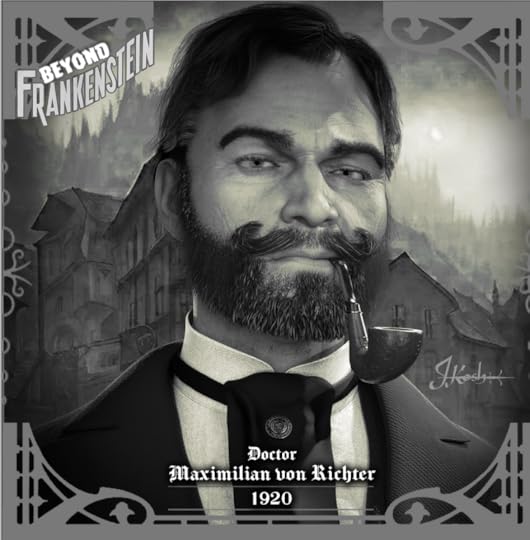
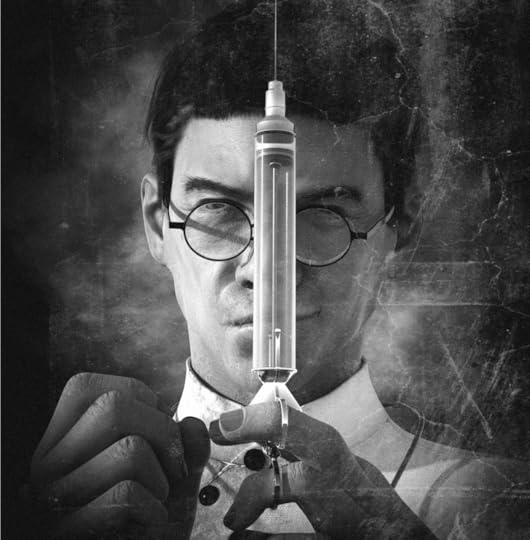
Maximilian von Richter and Hannibal Buchwald
Me: And let me say that she is right. It’s your niche and you shine in it! Okay, next question. When naming your characters, do you give any thought to the actual meaning?
JK: Yes, I do. It’s up to the readers to discover some of the ‘Easter eggs’ behind my names. Sometimes they are chosen because they help me visualize the character in my mind by association. For example, I imagined one of the baddies in Beyond Frankenstein to look like Boris Karloff’s Morgan, the homicidal butler in The Old Dark House. Being a Croat, I called him Boris Kovacs.
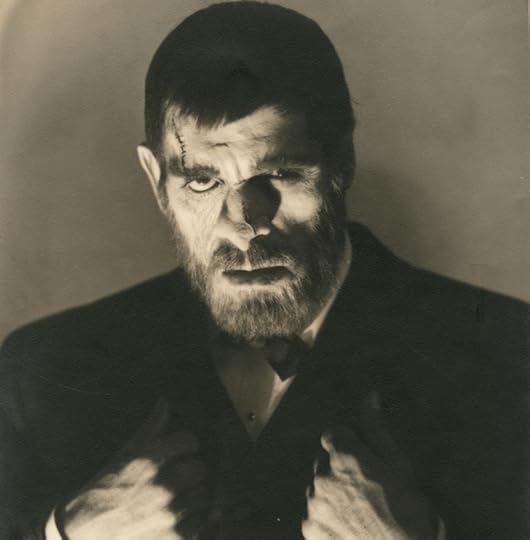
Boris Karloff as Morgan in The Old Dark House (1932)
Me: What are the major themes of your work? How long on average does it take you to write a book?
JK: I usually don’t think about themes, but some stuff keeps reappearing in most of my stories. Things like inhuman spirits coming from another place, artificial vs. natural life, and the strong bonds of love and friendship.
Me: As a writer you can most surely weave an internal struggle into your storyline and the reader may not realize it until the end. That’s when your audience has that sudden realization; Oh yeah, I didn’t see that coming. Do you know what I mean? Is that something you do often? A writing style you prefer? Or are your stories an “open book” so to speak?
JK: I always start with the villain. I need to know who they are, what they do, and why they do it. Then I put myself inside the community that is suffering the villain’s actions. How do they react? Finally, I create the main characters, the story’s heroes.
However, there was one exception to this process, my novelette FIVE. That one was born out of hearing the voice of the main character inside my mind asking the question, “What would you do if you knew when and where you are going to die?” over and over. It was really bothering me, so I let the guy speak and tell his tale.
Me: Okay, that’s not creepy at all. But at the same time, that would be the question, wouldn’t it? What would you do? I’d want to know…even if I didn’t. But then, if you try to avoid it do you inadvertently end up causing it? I had a similar idea where people are given an amount of time before they would die and one guy steals away to the woods to avoid Death only to get mauled by a grizzly. I never actually penned the idea though. Anyway, who are your target readers?
JK: People who like classic horror movies and ‘old voices’ such as Shelley, Stoker, Lovecraft, and Poe. But most of all, readers that like historical settings, as I love writing tales set in the past.
Me: I get the impression you’re what we would call ‘an old soul’. Right or wrong, it seems to fit your writing. What do you think readers search for in a book?
JK: We are all different. There’s plenty of readers that like stuff I wouldn’t touch; things with a lot of gore and sex, monster romance, urban fantasy. I don’t judge. But they don’t do it for me. Personally, I like gritty stories about ‘human’ monsters and those who hunt them.
Me: And that’s mostly what I write. I tend to call it ‘retail fiction’ because, at the moment, it seems to be what a good portion of the public is searching for. I guess I’m lucky that I enjoy writing what they’re looking for. What is your favorite part of a book?
JK: The part where I finally write ‘The End’.
Me: That is a good feeling, isn’t it? If that’s your favorite, then what is the hardest part of writing for you?
JK: Remaining coherent and focused and avoid wandering off into uncharted—and unnecessary—side stories. Trying to have the right human reactions to the unfolding events. Making sure that all storylines are closed before the end of the book. Going back, after you finish, and fix all those elements that don’t add up.
Me: I gotcha. That was a difficult thing for me to get over. Realizing I didn’t have to cover every minute of every day. Accepting that it’s okay to allow the reader to assume the small details so I can carry on to the next ‘point’ in the story. I know that you’re an awesome graphic artist, but what is the best thing about being an author, as well?
JK: Having readers tell you that they read your story. Sometimes readers don’t realize how much it’s important for us writers to receive feedback. Even negative one.
Me: Agreed! But TBH, the positive feedback is much better received than the negative. For me, anyway. Call it a fragile ego. So, do you listen to music while you write?
JK: Absolutely not. I already have enough trouble at focusing with all the noise around me. Both Auterive and Goldstadt are quite busy places.
Me: I get it. I’ve tried listening to music with words and couldn’t concentrate. But movie scores? Heck yeah. Epic movie scores work even better for me. Lately I’ve been listening to a lot of Celtic and Viking music. It seems to help when there’s a battle scene to be written. What and/or who inspires you?
JK: Random things. It can happen that I watch a movie or read a book and then fall in love with a specific character in the story. So I decide to give that ‘personality’ a twin inside the book I’m writing. Or a specific setting. As I said, The Haunter of the Moor was conceived by my short Halloween holiday in Ireland in 2015.
Me: Have you ever collaborated on a book? If so, who was the other author? How did you collaborate with that author? What writing process did you use?
JK: Never. I’d like to, but I have no idea of how to do that. There is surely a process to co-writing, but… I’m a frigging control freak, so I work better alone.
Me: I get it. I’m the same way. But I’ll admit, I did a trilogy with Jack Wallen a while back and it was a bit rocky at first, but then we seemed to find a groove and I’ll admit, when it was over I was ready to do another one. Maybe one day you’ll find the right partner and attempt something like that. It might be a little challenging at first, but I think the experience helped me as a writer. If you wrote a book about your life, what would the title be?
JK: I would never write a book about my life. Not interested. I know, I have had quite an adventurous life, being born in Rome, Italy, having lived in two states in the US, then Thailand, England, and now France and Wissenheim (heck, now that I think about it, I sound like a fugitive). I have wrestled alligators (small ones), driven a herd, ridden elephants, and being close to many dangerous animals. I have been behind the set of the Babylon 5 TV show and I have played a minor character in the Far Cry 3 video game and short movie. I have met a lot of famous people, including two popes and one Italian president. I have been a delivery boy, a waiter, a concierge, a funeral director for many years, and a smalltime actor. I have lived like an ‘international man of mystery’ for most of my life. But I wouldn’t write about myself.
Me: Dude…you NEED to write your story. My life seems boring in comparison. Let me think…what question have you always wanted to be asked in an interview, but never have?
JK: I think I have covered almost anything.
Me: Okay. What have you written? And what are you working on at the moment? What’s it about?
JK: There are four full novels: Feeding the Urge, Dead Men Tell No Tales, The Haunter of the Moor, and Beyond Frankenstein.
Then there are the novelettes and short stories that can be found in personal collections such as Spirits and Thought Forms-Tales from Prosperity Glades and Tales from the Dead. Many of my short stories have been showcased in anthologies. Special mentions should go to Bloody Bones, a Christmas horror tale set in the lovely village of Dunster, Somerset (UK) featured in the A Tree Lighting in Deathlehem (2019) anthology by Grinning Skull Press, and Last Chance, a short psychological thriller that deserves more love, as unfortunately people are barely aware of its existence. You can find this one in the Maximus Shock (2017) anthology by Optimus Maximus Publishing.
I also wrote two short erotic novels (Thrill of the Hunt and Home Invasion), and the screenplay for a slasher comedy horror movie that was never shot called Respawn.
I’m currently writing a sequel to Beyond Frankenstein which expands on the horrible possibilities offered by the Zeigler Serum and its true, dark origins.
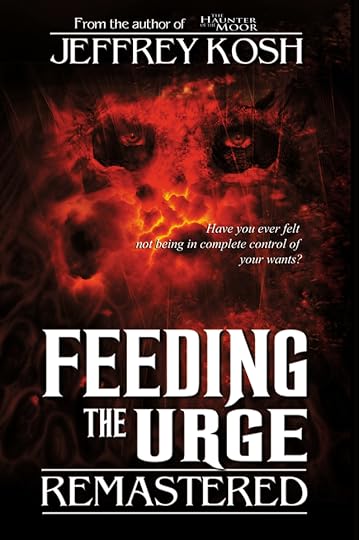
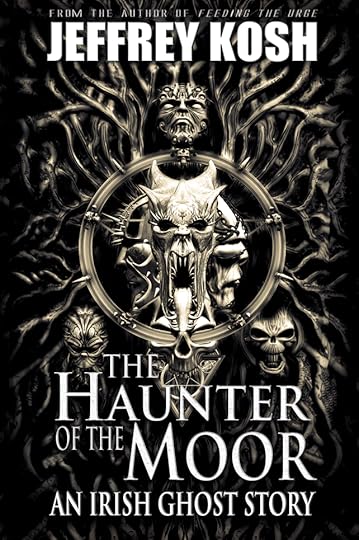
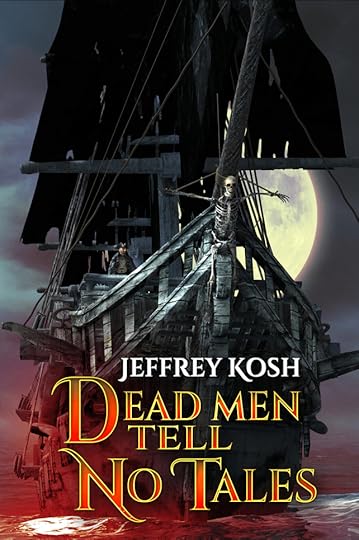
Feeding the Urge (2012), Dead Men Tell No Tales (2012), and The Haunter of the Moor (2016)
Me:Nice! Where can we buy or see them?
JK: You can either search my name online or visit my website.
https://jeffreykosh.wixsite.com/jeffreykosh
My stories are all available through the usual channels, except for Beyond Frankenstein; this is a Kindle Unlimited exclusive only available at Amazon. If you are enrolled in their program you can read it for free. Published by JaFra Publishing.
https://www.amazon.com/stores/Jeffrey-Kosh/author/B0074F2VGU
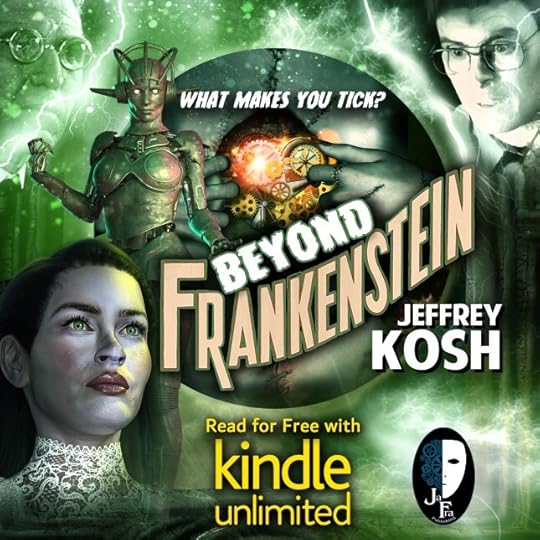
Beyond Frankenstein, Kindle Unlimited
Oh, one last thing. I don’t mind if you pirate my books, as long as you don’t make a profit out of it. Then I get pissed and I come after you. They did this trick once with a completely free novelette called Black Brig (my debut fan fiction based on a comic book) and I reacted accordingly. Also, please, if you read my books for free, at least leave a review.
Me: I hadn’t thought of that way, but I guess that’s a positive way to look at the inevitable. Pirates are gonna pirate, so what can you do? What advice would you give to aspiring writers?
JK: Do as you wish and feel. If you want to write good fiction write what you like. If you want to try and make money out of it… follow the trends and the algorithms. I can’t.
Me: Is that a nice way of calling me a sell-out? Just kidding! I actually like writing what I do. Thankfully, the grand majority of it is what people are looking for. Still, sometimes what seems like a heck of an idea in my head ends up flopping on the retail market. Oh, well. I’ll keep writing what interests me.
Well, I think we’ve about covered everything. Is there anything that you would like add?
JK: Yes, give Beyond Frankenstein a chance. It’s my best book so far.
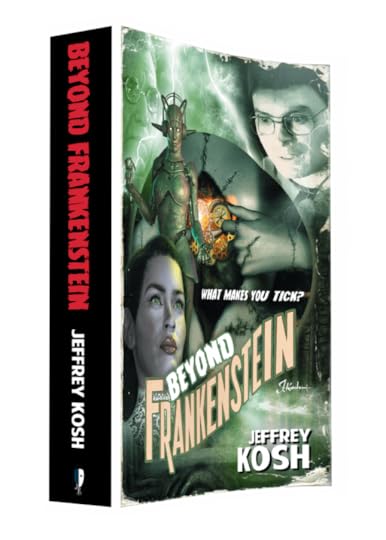
Beyond Frankenstein (2025)
Me: Last question, what do you consider your best accomplishment?
JK: Keeping on living, adapting every time I needed to. Living in other countries and respecting their cultures and differences, always mindful about me being a guest. And finally, creating a name in art for myself after so many years of doing the most disparate and non-art related jobs.
The Wunderturm in Goldstadt
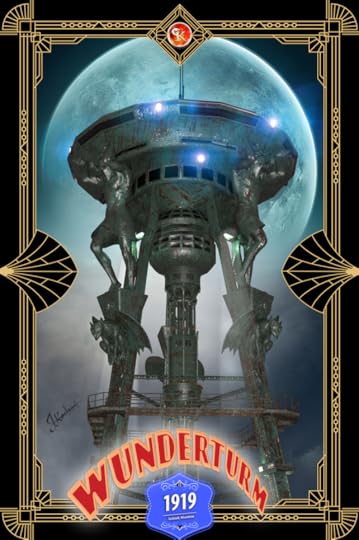
As we shake hands, I remind Jeff that he has to work on the cover of Genoswka 6, and then I descend the large stairwell to the first floor. Luckily, Ronny Cicero is nowhere to be seen, probably busy chattering with Richter’s housemaid. When I leave the beautiful townhouse at 22 Kronenstrasse I spot a guy in tuxedo that looks exactly like me. Our eyes meet and then he flees. I chase him amidst the hustle and bustle of the university quarter but I soon lose track of the uncanny man.
I think it’s time for me to go back home. Home, before I go crazy and they put me inside a padded cell at Waldenburg Asylum.



